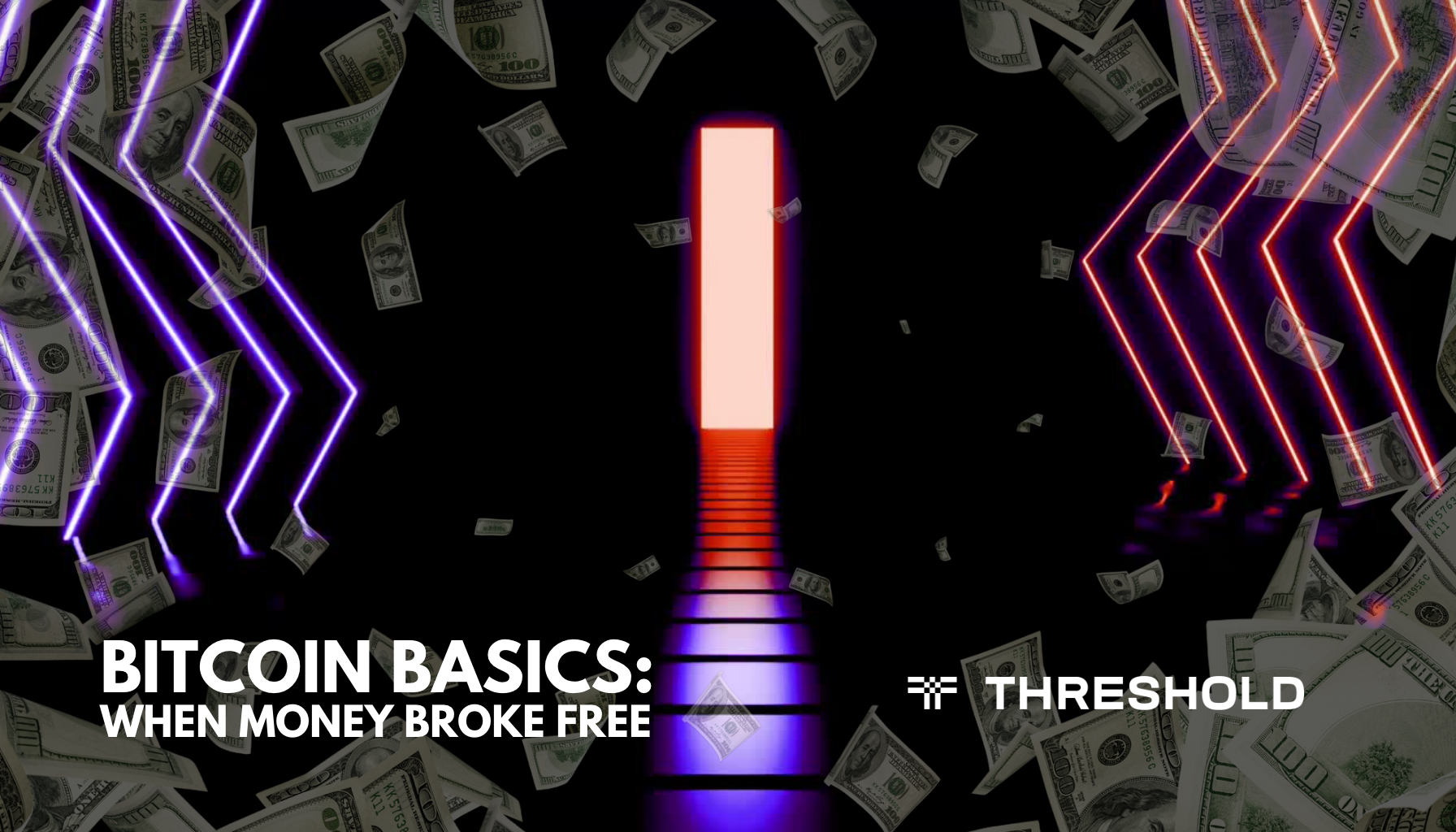Bitcoin Basics: When Money Broke Free
Bitcoin is backed by mathematics, energy, and the most powerful computer network ever built. Unlike traditional financial systems, you can verify Bitcoin's rules and operation yourself - there is no trust required.

TL;DR: Imagine you could design money from scratch today, to be built for a digital world where information moves at light speed. What would it look like? It would probably look a lot like Bitcoin - borderless, available 24/7, controlled by mathematics instead of politicians. This isn't just a new technology; Bitcoin is an entirely new way of thinking about value itself.
The Problem with Money 1.0
Your smartphone can send a message to Tokyo in seconds, stream movies from servers across the planet, and access humanity's collective knowledge instantly. Yet somehow, in 2025, it still takes three business days to move money between bank accounts?
Think about that for a moment. Your tweets travel faster than your dollars. Your Instagram photos cross oceans more easily than your payments. In a world where everything else has gone digital and global, money remains stubbornly anchored to systems designed in the age of steam engines and telegraphs.
The Three Problems Bitcoin Solves
Before 2009, digital money seemed impossible because of three fundamental challenges:
- Digital Copying: How do you make something digital truly scarce when everything can be copy-pasted?
- Double Spending: How do you ensure the same digital money isn't spent twice?
- Central Authority: How do you verify transactions without trusting a middleman?
Bitcoin solved all three through mathematical elegance. Like Einstein's E=mc², the solution was both simple and revolutionary.
How Bitcoin Actually Works
Think of Bitcoin like a giant shared ledger that tracks every transaction ever made. Instead of living on one computer, this ledger exists simultaneously on thousands of computers worldwide. Any change must be verified and agreed upon using complex mathematics. That's Bitcoin at its core - a shared record of who owns what, governed by mathematical rules rather than human authorities.
Bitcoin's mathematical scarcity is precisely defined in its code. Nearly 19.5 million Bitcoin exist, with new creation slowing to a trickle until the final Bitcoin emerges around 2140. This isn't a policy decision - it's an immutable mathematical fact built into the system's DNA.
Getting Started: The Essential Steps
Your Bitcoin journey starts with three simple steps:
- Choose Your Wallet
- Mobile “hot” wallet for everyday use
- Hardware “cold” wallet for savings
- Never share private keys
- Buy Your First Bitcoin
- Start with $10-100
- Use established services
- Focus on learning
- Practice Basic Security
- Back up recovery phrase
- Use 2-factor authentication
- Keep keys offline
Using Bitcoin in Real Life
Picture Sarah, a graphic designer in Chicago. Last month, she used Bitcoin in various ways without breaking a sweat. She paid her international developer with Bitcoin through Ethereum - instant settlement, near-zero fees, no bank holidays or SWIFT delays. She saved 40% on Amazon purchases through blockchain-powered gift card services. When her international client in Singapore paid a $10,000 invoice, Bitcoin saved them both a small fortune in bank fees.
To expand her studio, Sarah leveraged her Bitcoin holdings through Ethereum's DeFi protocols, securing a 0% interest loan. This meant she kept her Bitcoin exposure during a market upswing, avoided triggering taxable events, and paid off the loan with her growing Bitcoin profits - all without setting foot in a bank.
That's Bitcoin in 2025. It's not just about buying and holding anymore. When we zoom out, we can see how the entire cryptocurrency ecosystem has evolved to complement Bitcoin's role as the foundation of digital value.
Ethereum has established itself as the leading platform for DeFi applications, smart contracts, and decentralized applications, while also supporting Bitcoin integration through wrapped tokens. Different blockchain networks have emerged to serve distinct purposes - some focusing on micropayments, others on specific applications like gaming or identity.
While Bitcoin pioneered the concepts of digital scarcity and decentralized consensus, these other networks have built upon these foundational ideas to create their own unique value propositions. Rather than being dependent on Bitcoin, they've adapted and expanded these core principles to serve different use cases and communities. This has created a diverse blockchain ecosystem where different platforms complement each other while maintaining their own independent utility and value.
As a user, you can choose the right tool for each job while still anchoring to Bitcoin's fundamental security and value proposition. Major businesses from Cash Apps to Strike have integrated these solutions right into their apps, making Bitcoin as easy to use as any other payment method.
This isn't about competition between different blockchain solutions - it's about how they all work together to create a more efficient, accessible financial system with Bitcoin as its foundation. Each Layer brings its own strengths to the table, allowing users like Sarah to choose the most appropriate tool for each specific need while maintaining Bitcoin as their primary store of value.
Common Myths vs. Reality
The conversation around Bitcoin often gets muddied by misconceptions. Critics point to energy usage, but this overlooks how Bitcoin converts electrical power into financial security, increasingly drawing from renewable sources and actually helping stabilize power grids by providing flexible demand.
Narratives which often dominate the headlines:
- "Bitcoin uses too much energy!" shout the headlines. Let's look at what they're not telling you...
According to a 2021 report by the International Energy Agency (IEA), the traditional financial sector, including banking, contributes to about 1% of global energy consumption.
Bitcoin's energy usage secures a global financial network that runs 24/7/365 without ever being hacked. More importantly, it's driving green energy innovation - miners are literally building solar farms and capturing methane from oil wells that would otherwise be wasted.
- "It's too volatile!" they say. Yet Bitcoin has been the best-performing asset of the last decade.
Ask the citizens of Argentina or Turkey whether they'd prefer their inflating national currencies or Bitcoin's "volatility." In 2025, major corporations hold Bitcoin on their balance sheets, and El Salvador's move to make Bitcoin legal tender has survived despite mainstream criticism.
- "It's not backed by anything!" This one's ironic, coming from a world of endlessly printed fiat currencies.
Bitcoin is backed by mathematics, energy, and the most powerful computer network ever built. Unlike traditional financial systems, you can verify Bitcoin's rules and operation yourself - there is no trust required.
Making Bitcoin Work For You
Bitcoin opens up possibilities that traditional finance can't match:
- Save without inflation eating your wealth
- Send money anywhere, anytime
- Control your own financial destiny
- Participate in the future of finance
But like any powerful tool, it requires understanding to use effectively. Start small, learn continuously, and build your knowledge over time. You're still early - understanding Bitcoin today is like understanding the internet in 1995.
Unblocking the Future
Think of where we are with Bitcoin as similar to the internet in 1995. Email was confusing, websites were basic, and most people couldn't imagine shopping online. Yet here we are. Bitcoin's trajectory is similar - we're building the future of money, one block at a time.
Think about what email did to postal mail, what Netflix did to Blockbuster, what Amazon did to retail. Bitcoin isn't just building a new financial system - it's upgrading the very concept of money itself.
The questions you face are simple: Will you learn to use these tools before you need them? Will you understand this technology before it becomes as common as email? The tools are ready. The network is running. The future is already here - it's just not evenly distributed yet.
The fundamental question isn't whether Bitcoin will change finance - that's already happening. The question is how you'll participate in this transformation. Whether you're just starting with your first wallet or preparing to explore DeFi's possibilities, you're part of a historic shift in how humanity thinks about and uses money.
Remember: The best time to understand Bitcoin was ten years ago. The second best time is now.
If you’re ready to dive deeper into the foundations of Bitcoin, there’s no better place to start than the original vision itself. Read the Bitcoin Whitepaper and discover how it all began.


